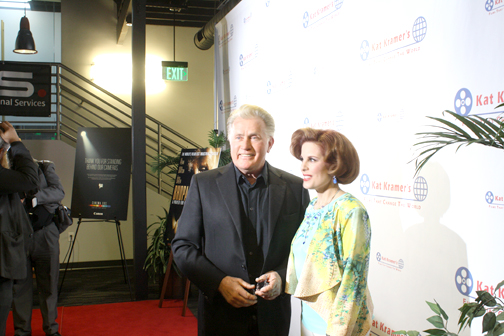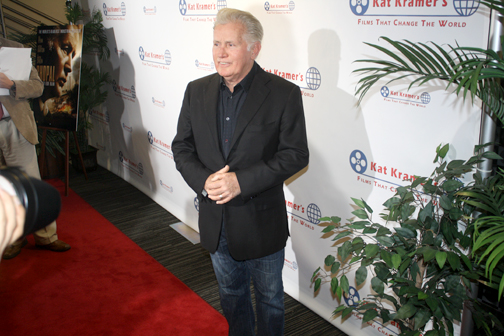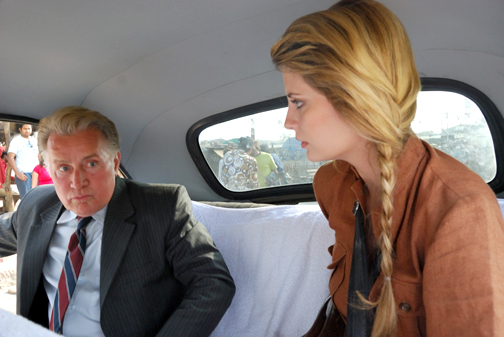
By Jason KUROSU
The 2014 film “Bhopal: A Prayer for Rain” was the subject of the 7th Kat Kramer’s Films That Change the World, an annual series dedicated to films highlighting major social issues, in this case, the Dec. 3, 1984 Bhopal disaster.
Starring Martin Sheen, Mischa Barton and Kal Penn, the film delivers a depiction of the events surrounding the industrial gas leak at Union Carbide’s pesticide plant in Bhopal, which spread methyl isocyanate (MIC) into nearby towns, killing and injuring thousands, while leaving behind a legacy of birth defects and disease which persist in the present day Bhopal population.
The event, held at the Canon USA, Inc. Screening Room in Los Angeles Friday night, featured a screening of “Bhopal: A Prayer For Rain” and a panel discussion after the film with the film’s director Ravi Kumar, executive producers Terrance A. Sweeney and Leszek Burzynski, director of photography Charlie Wuppermann and Bhopal Medical Appeal executive trustee Tim Edwards.
The film depicts the disaster from a variety of perspectives, plant workers in harm’s way from both unsafe working conditions and living in such close proximity to the plant, journalists investigating the harmful effects of MIC and other chemicals produced at Bhopal, and Union Carbide officials seeking cheap labor in India and divorcing themselves from responsibility after the gas leak.
Kat Kramer said she hoped the series was a worthy continuation of the legacy of her father, director Stanley Kramer, who often addressed social issues through film, as seen in “Guess Who’s Coming to Dinner” and “On the Beach.”

Other films featured in Kat Kramer’s Films That Change the World included “The Cove,” a documentary covering animal abuse in Japan, “The Decent One,” a look into the life of Nazi Gestapo Chief Heinrich Himmler, and the first film of the series, “Yentl” which addressed women’s equality.
The event also served as a fundraiser for the Bhopal Medical Appeal, which has helped establish two clinics in Bhopal, the Chingari Trust Rehabilitation Centre and the Sambhavna Trust Clinic. Partly funded and supported by the Bhopal Medical Appeal, the clinics provide free medical care that blends modern and herbal medicine, physical therapy, speech therapy, yoga therapy and more.
At the event, donations could be made directly to the organization and posters signed by members of the cast and crew were auctioned off for charity. Kramer said that the event “raised several thousand dollars at the event and more funding will be forthcoming in the next several weeks as a result of live streaming of the event worldwide via Global Content Media, LLC.”
According to Edwards, the clinics receive about 200 children a day, six days a week. Despite being two or three generations removed from the disaster, a number of children in Bhopal suffer from respiratory and neurological ailments, inherited afflictions from their ancestors’ gas exposure and the population’s continuing exposure to contaminated water.
“Bhopal is a disaster with a beginning, but no end,” said Edwards, who called “the challenge of memory” the largest hurdle the organization faces, as awareness and remembrance of the atrocities fades from public memory while the aftereffects persist in Bhopal.
However, one piece towards raising awareness emerged with a script written by Kumar and David Brooks Miller, which Edwards was made privy to nine years ago.
“To my surprise, there was not a mainstream film [on Bhopal] made, even by Indians,” said Kumar.

Edwards originally had reservations about whether the film could successfully portray and honor those involved in the Bhopal disaster, especially considering court proceedings regarding the incident were still ongoing.
But Edwards “was happy to say that my doubts were proven false,” hailing the film as “the most realistic recreation of Union Carbide’s gas disaster in Bhopal ever committed to film.”
Union Carbide settled with the Indian government in 1989, paying $470 million in damages. Seven former Union Carbide India Limited employees were convicted of death by negligence and sentenced to two years imprisonment each. Union Carbide chairman and CEO Warren Anderson (portrayed by Martin Sheen in the film) was originally charged with manslaughter by the Indian government, but never appeared in court, instead escaping extradition from the United States due to a lack of evidence.
Union Carbide was purchased by Dow Chemical in 2001. Warren Anderson passed away at a Florida nursing home in September 2014.
